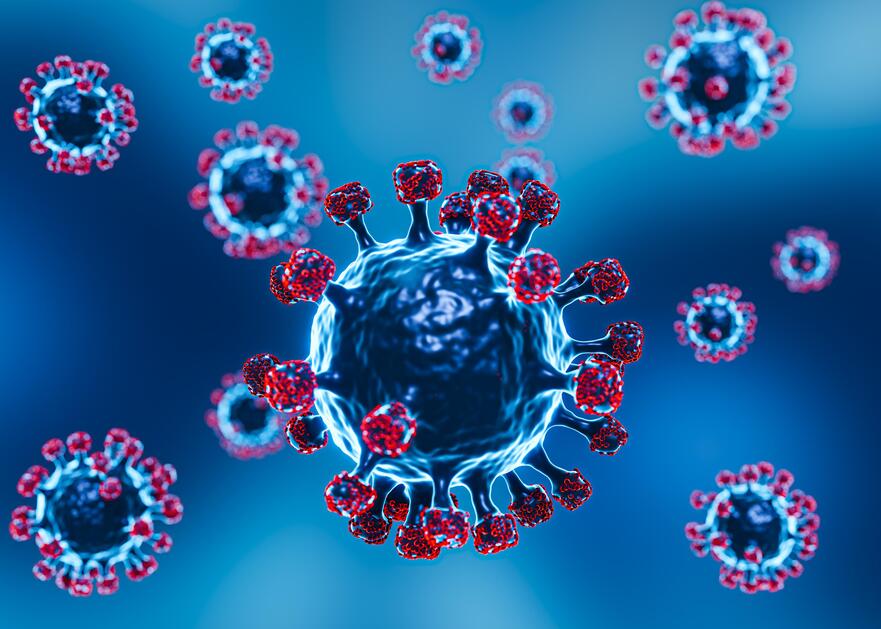

New research from UC Davis Health has some good news about COVID-19 and kidney health. Even though many people in the hospital with COVID-19 face kidney issues, like acute kidney injury (AKI) and other problems, this study found that the virus is not strongly associated with the long-term loss of kidney health of those affected by COVID-19. So, it seems like COVID-19 might not have a big impact on long-term kidney health.
“Early in the COVID-19 pandemic, kidney abnormalities were often recognized in patients with COVID-19,” said Hiba A.M. Hamdan, the principal investigator of the study and health sciences assistant clinical professor in the Division of Nephrology. “Given how infectious COVID-19 was and the large numbers of individuals being hospitalized with the virus, it was imperative we better understand the short and longer-term kidney sequelae of COVID-19 infection so we could prepare if we saw a significant uptick in the incidence of chronic kidney disease.”
In the pandemic’s initial year, research revealed that more than 25% of COVID-19 hospital patients faced AKI, a sudden kidney issue. Acute kidney failure, or acute renal failure, is swift kidney damage occurring within hours or days. Some reports noted continued long-term kidney function issues post-COVID-19 despite relatively short follow-up periods.
“Given how infectious COVID-19 was and the large numbers of individuals being hospitalized with the virus, it was imperative we better understand the short and longer-term kidney sequelae of COVID-19 infection so we could prepare if we saw a significant uptick in the incidence of chronic kidney disease at all stages.”Hiba A.M. Hamdan
In investigating potential long-term kidney issues in hospitalized COVID-19 patients, researchers analyzed electronic health records from adults in the University of California (UC) Health System, encompassing six medical centers. They looked at:
- Individuals who underwent PCR testing and tested positive for SARS-CoV-2 between March 1, 2020, and Dec. 31, 2021.
- Patients hospitalized within 10 days of testing.
- Patients hospitalized for at least one day.
- Individuals not diagnosed with end-stage renal disease.
- Non-pregnant patients.
The AKI inpatient cohort comprised 5,451 COVID-19 individuals, averaging 59 years in age, with 59% being male and 45% Hispanic. The rate of COVID-19 patients experiencing AKI fluctuated between 20-38% throughout the reviewed period.
Researchers assessed long-term kidney function in the cohort by examining estimated glomerular filtration rate (eGFR) trajectories. This involved individuals with COVID-19 and a distinct group with AKI (acute kidney failure) but without COVID-19. The study followed patients until Dec. 31, 2022, and found no significant difference in eGFR loss between the two groups during the roughly two-year follow-up period.
Likewise, a sizable cohort studying the enduring impacts of COVID-19 on kidney function found comparable results. This pertained to patients who did not experience a hospitalization event within 10 days after the initial SARS-CoV-2 PCR testing.
“This study has important implications because we examined a very diverse cohort from one of the largest healthcare systems in California and had one of the longest reported follow-up periods of kidney function following COVID-19 infection,” explained Hamdan. “Our hope is that these findings help guide our healthcare system and others in planning for post-COVID-19 care.” This also has implications for other respiratory viruses and how they can impact kidney function.
Source: UCDavis Health
more recommended stories
 Pediatric Crohn’s Disease Microbial Signature Identified
Pediatric Crohn’s Disease Microbial Signature IdentifiedKey Points at a Glance NYU.
 Nanovaccine Design Boosts Immune Attack on HPV Tumors
Nanovaccine Design Boosts Immune Attack on HPV TumorsKey Highlights Reconfiguring peptide orientation significantly.
 High-Fat Diets Cause Damage to Metabolic Health
High-Fat Diets Cause Damage to Metabolic HealthKey Points Takeaways High-fat and ketogenic.
 Acute Ischemic Stroke: New Evidence for Neuroprotection
Acute Ischemic Stroke: New Evidence for NeuroprotectionKey Highlights A Phase III clinical.
 Statins Rarely Cause Side Effects, Large Trials Show
Statins Rarely Cause Side Effects, Large Trials ShowKey Points at a Glance Large.
 Anxiety Reduction and Emotional Support on Social Media
Anxiety Reduction and Emotional Support on Social MediaKey Summary Anxiety commonly begins in.
 Liquid Biopsy Measures Epigenetic Instability in Cancer
Liquid Biopsy Measures Epigenetic Instability in CancerKey Takeaways Johns Hopkins researchers developed.
 Human Antibody Drug Response Prediction Gets an Upgrade
Human Antibody Drug Response Prediction Gets an UpgradeKey Takeaways A new humanized antibody.
 Pancreatic Cancer Research: Triple-Drug Therapy Success
Pancreatic Cancer Research: Triple-Drug Therapy SuccessKey Summary Spanish researchers report complete.
 Immune Cell Epigenome Links Genetics and Life Experience
Immune Cell Epigenome Links Genetics and Life ExperienceKey Takeaway Summary Immune cell responses.

Leave a Comment